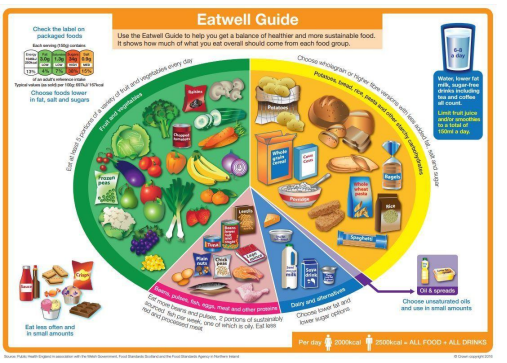Healthy Eating
Introduction
Grove CE Primary School is dedicated to providing an environment that promotes healthy eating and enables pupils to make informed food choices. This will be achieved by the whole school approach to food provision and food education documented in this policy. This policy has been written in line with the Government guidance ‘School Food Standards Practical Guide’.
School food standards practical guide - GOV.UK
Aims
The main aims of our school food policy are:
1. To provide a range of healthy food choices throughout the school day
2. To support pupils to make healthy food choices and be better prepared to learn and achieve
3. To ensure a consistent approach to healthy eating across the school community including pupils, staff and parents/carers
Food throughout the school day
Breakfast
Breakfast is an important meal that should provide 25% of a child’s energy requirement and supports pupils to be ready to learn at the start of each day.
School Lunches
School meals are provided by Dolce and are served between 11.45am and 12:30, in the dining hall. The school meals meet the mandatory requirements of the DfE Guidance School Food in England 2021. School meals are planned on a 3 week cycle and always contain a meat, vegetarian option, or jacket potato.
Packed Lunches
The school strongly encourages all pupils to have a school lunch as this ensures they are receiving a nutritionally balanced diet across the whole week. If parents/carers choose to supply their own packed lunch, we recommend that the packed lunches mirror the national school food standards to provide a balanced midday meal that should include:
- a (fist sized) carbohydrate portion for energy (such as a roll, bagel or pitta bread, a wrap or a potato, pasta, rice, rice cake, couscous or noodle salad) These starchy foods are important for children. They are filling and provide energy.
- protein (a palm sized portion of, for example meat, chicken, tinned fish, beans, hummus, egg or cheese) Growing children need the protein, iron and vitamins these foods provide.
- a dairy portion (eg size of two fingers of cheese, a cup of milk, fromage frais or yoghurt) The calcium and protein in this food group are needed for building strong bones and teeth.
- vegetables and fruit (like salad, carrots, celery, tomatoes or cucumber and all kinds of fresh or dried fruit) These foods provide fibre and vitamins which help to keep your child healthy.
- You could also give your child one of the following: Extras - fruit bread/ malt loaf/ banana cake/ plain fruit/ cheese scone etc
Some packed lunch ideas are here:
Lunchbox ideas and recipes – Healthier Families - NHS
https://www.superhealthykids.com/kid-lunchbox-photo-roundup-90-healthy-lunches/
https://www.healthycornwall.org.uk/media/riqo4w41/under-5-s-healthy-lunchbox-card_a5_web.pdf
Packed lunches must not contain food items that go against the healthy eating ethos of school and promote hyperactivity in children. These foods include:
● Fizzy drinks
● Chocolate (including chocolate biscuits)
● Sweets
We ask parents to restrict certain food items that have been proven to include unhealthy levels of salt, fat and sugar if consumed too often and can also have a detrimental effect on behaviour. These foods/drinks include:
● Crisps
● Cakes
● Fruit or Vegetable Juice (150ml max)
The school provides water for all pupils at lunchtime and throughout the school day.
Snacks
The school understands that healthy snacks are an important part of the diet of young people. Early Years and Key Stage 1 children are all provided with a piece of fruit or vegetable during the day. Children in KS2 may bring in a snack to have at breaktime. This snack must not contain food items that go against the healthy eating ethos of school and promote hyperactivity in children as indicated above.
What are snacks for?
Snacks are meant to provide a boost of energy if a few hours pass between meals and blood glucose levels drop. Snacks are not TREATS – this is something different and can be enjoyed every now and then as a treat - AT HOME.
Use some of the ideas for lunches to give your child a worthwhile snack and remember that chocolate, confectionary and highly processed fat and sugar content products are not recommended or encouraged. Manufactured food high in fat or sugar are NOT allowed eg sweets, chocolate bars etc. Children who eat these at lunch can be lethargic and less focused for the afternoon and not be the best learners they can be. Here are some more ideas:
under-5-s-healthy-snacks-card_a5_web.pdf *This website recommends some nut products – we do not allow nuts in school.
Elite Sports
Elite Sports, our wrap-around care provider, provide breakfast and an after school substantial snack which is nutritional balanced.
Drinks
Water is freely available in all classrooms and all children must bring in their own named water bottle to use. Children are not allowed to have any other drinks in their water bottle, including; fizzy drinks, sugary drinks, or milk. Children are actively encouraged to drink water regularly throughout the day.
Special Occasions
The school recognises the importance of celebrating birthdays and special occasions. Parents and Carers are requested to support the school policy by refraining from distributing sweets or cakes at school. For celebration events organised in school, we welcome a variety of healthy foods from different cultures, for children to try.
Curricular and extra-curricular activity
There is a strong emphasis on the teaching of healthy lifestyle choices in all curriculum areas across the school but particularly through our PSHE curriculum and our Food Technology curriculum. The Eatwell Guide is used throughout the school to support children’s understanding of a balanced diet. (Appendix 1)
Lunchtime and after-school activities and clubs also support the teaching of healthy lifestyle choices.
Special dietary requirements
The school does everything possible to accommodate pupils’ specialist dietary requirements including allergies, intolerances, religious or cultural practices. Individual Health Care Plans are created for pupils with food allergies. Pupils’ food allergies are recorded on our MIS system and the school kitchen.
For those children with Special Education Needs, special dietary requirements must be agreed with the class teacher and SENCo, and recorded within their Individual Pupil Profile.
Expectations of staff and visitors
The school expects staff to contribute to and support this Healthy Eating Policy across the school day. Staff and visitors are expected to model good practice around food and drink in line with the policy, when in the company of pupils.
Parents, carers and family members
Our relationship with Parents and Carers is very important and we aim to support them with information and advice around food, so that they are best prepared to make healthy choices for their families


